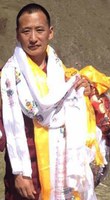




Chinese authorities have released a senior Tibetan religious figure and a writer, both of whom had campaigned to protect the Tibetan language, after they completed their full terms in prison, according to sources in the region and in exile.
Writer Sungrab Gyatso’s health had deteriorated during his three-year prison term, the sources said, citing kidney and back problems.
He and Adrel Lobsang Tenzin Rinpoche of the Wonpo monastery in Sichuan province’s Sershul (in Chinese, Shiqu) county had been jailed for activities deemed to have challenged Chinese rule and were greeted as heroes by supporters who lined the roads to welcome them following their release this month, the sources said.
Adrel Lobsang Tenzin Rinpoche, who served five years, was released on May 15 and returned to Wonpo monastery on May 25 “amid a grand reception and welcome by the monks and his followers,” an India-based Tibetan monk told RFA’s Tibetan Service this week.
“Local devotees offered prayers for his long life, and Lama Adrel preached to them on the importance of preserving the Tibetan language and unity among Tibetans,” Jampa Yonten said, citing sources in the region.
“In a few days, Adrel Rinpoche will visit the Adrel monastery in Chumarleb [in Chinese, Qumalai] county in [Qinghai’s] Yulshul [in Chinese, Yushu] Tibetan Autonomous Prefecture,” Yonten added.
'State secrets'
Adrel Rinpoche was detained on March 15, 2008 in the Tibetan regional capital Lhasa and was sentenced to a five-year term after being charged with disclosing “state secrets,” Yonten said.
His three sons—Dasher, Lodroe, and Sonam Dragpa—were each sentenced in the same year to 10-year terms and are still serving out their sentences, he said.
The nature of the accusations made against Adrel Rinpoche and his sons was not immediately clear, but the charge of disclosing state secrets is sometimes made against Tibetans who spread news of Tibetan protests abroad.
“Nine monks were also detained in the Wonpo area in October 2012 and are still being held, and the local Tibetan community is very worried about them,” Yonten added.
Significant contributions
